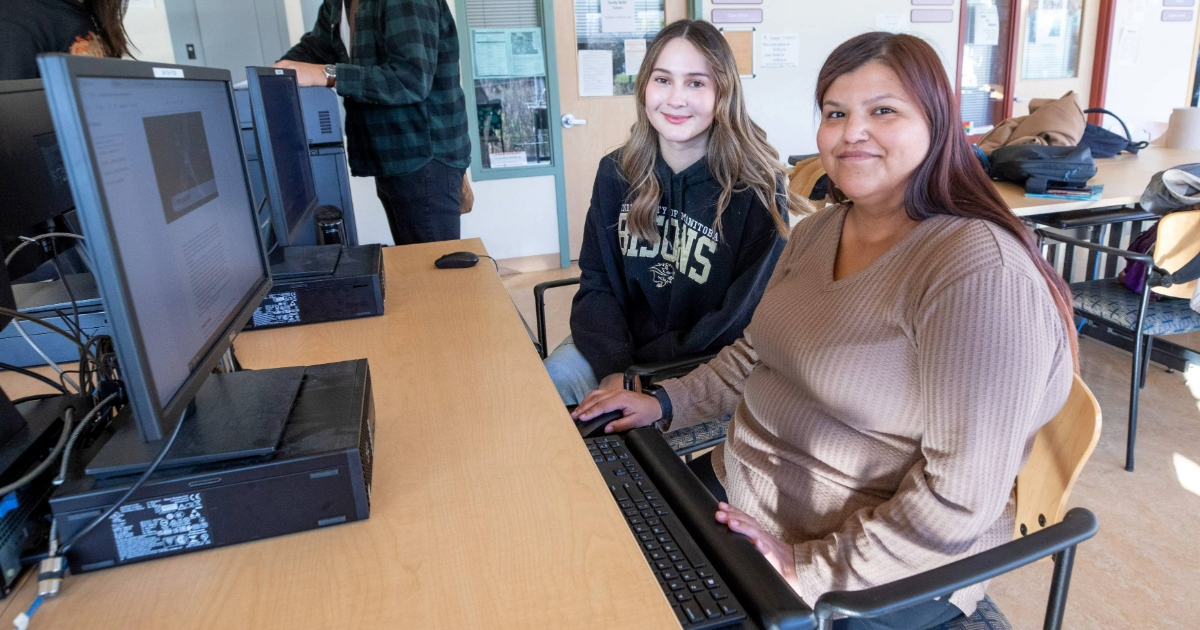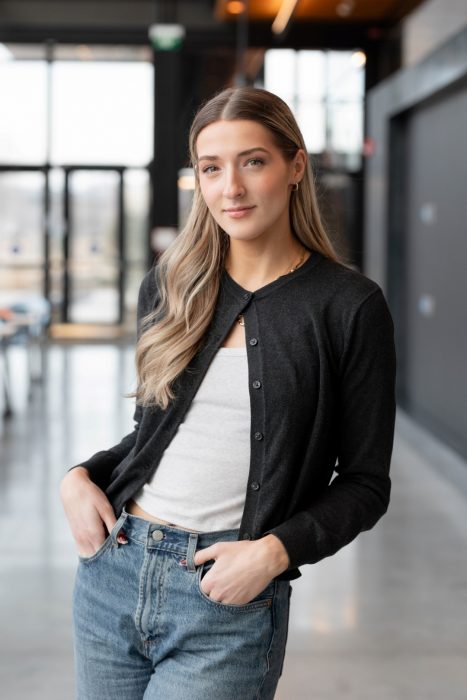
The Neechiwaken program supports first-year students through peer mentorship
Neechiwaken Indigenous Peer Mentor Program enhances support for first-year students
Mentor applications open now
UM student Chloe Ellerbrock says that as the eldest of six siblings, mentorship has always come naturally to her. That’s why she chose to participate as a Lead Neechiwaken in the Indigenous Student Centre (ISC)’s Indigenous mentorship program.

Chloe Ellerbrock
“I loved connecting with my mentee. Being a mentor is a reciprocal relationship where both mentees and mentors learn from each other,” says Ellerbrock. “My mentee and I would collaborate on ideas and share stories from our lives in a dynamic relationship that made me look forward to meeting with my mentee and fellow Indigenous students.”
The Neechiwaken Indigenous Peer Mentor Program helps first-year students in the Qualico Bridge to Success (QBTS) Program transition to university life by promoting student engagement and a sense of belonging on campus. The term Neechiwaken means “friend” in Cree.
The program matches first-year QBTS students with experienced Indigenous students called Lead Neechiwaken mentors who provide academic and social support as well as ongoing advice. Mentors are Indigenous students in any year of study, faculty or program.
The program provides all members with social, academic and cultural learning opportunities, peer-to-peer support, activities to support community building and the opportunity to be a Neechiwaken (friend) to one another.
Bailey Hendry, ISC student advisor and program coordinator, says the past year’s cohort of students were a lot of fun and really seemed to enjoy spending time together.
“We do a lot of activities that get us socializing and crafty,” says Hendry. “One of my favourite nights was our Halloween party in collaboration with the Blankstein Momentum Program. We all carved or painted pumpkins, wore costumes and listened to Halloween music after we shared a meal together. Meals are a common occurrence in our programming and provide us with the opportunity to connect in other ways that are rooted in culture and belonging.”
Ellerbrock says that the program builds a sense of community.
“Indigenous students come together in a safe space to learn from and enjoy one another’s company,” says Ellerbrock. “The UM is a huge environment that welcomes individuals from all walks of life, which can make it a bit difficult to meet people. This program has introduced me to many individuals that I now call friends and spend time with outside of program meetings.”
Students who become a Lead Neechiwaken have the benefit of meeting other Indigenous students, providing support and friendship to a first-year Indigenous student, gaining experience in mentoring and leadership skills and receive training on peer support and active listening.
There are monthly meetings that allow for both Lead Neechiwaken mentors and Neechiwaken mentees to take a break from school and connect with the community. Being a mentor and taking on the Lead Neechiwaken position is recognized in the Experience Record as well; and students can expect to have their experience added if they meet all the requirements throughout the academic year.
Hendry believes that mentoring is important because it gives students the opportunity to build trust with each other, provides a safer space for learning and allows everyone involved to engage in learning new things together. She adds that, as Indigenous peoples, community, mentors and Elders are the sources of guidance often needed to feel a sense of belonging.
“Many mentees have mentioned that they found their mentors to be an incredible source of support and guidance throughout the year,” says Hendry. “The friendships that are built are by far the best part and the monthly meetings provide students with the opportunity to form those friendships in a space like Migizii Agamik that is safe and familiar to them.”
Ellerbrock encourages anyone who is considering becoming a Lead Neechiwaken mentor to apply.
“Being part of Neechiwaken has allowed me to assist other students to achieve their goals as I am striving to achieve mine. I was taught to always give back to our community and to share when we have bounty,” says Ellerbrock. “With the Neechiwaken Indigenous Peer Mentorship Program I was able to do just that while learning from my own mentees. Bailey made the program super welcoming and inviting. She is very easygoing, which made talking to her about anything no problem at all.”
If you or someone you know may be interested in becoming a Lead Neechiwaken mentor please visit the Neechiwaken Indigenous Peer Mentor Program webpage.






